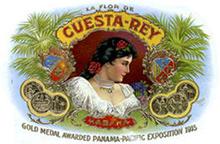
U.S. Sen. Marco Rubio, cosponsor of a bill aimed at saving Florida's landmark and oldest remaining family-owned cigar maker, visited the J.C. Newman Cigar Co. in the Ybor City section of Tampa Wednesday to give its employees hope and draw attention to the cigar maker's plight.
Rubio, with fellow Florida Sen. Bill Nelson, is the original cosponsor of the Traditional Cigar Manufacturing and Small Business Jobs Preservation Act (S. 441), a bipartisan bill that would exempt large and premium cigars from excessive and overly burdensome FDA regulations and fees.
It would effectively save the company, the jobs and a rich Tampa tradition. Established in 1895, J.C. Newman's premium cigars are sold in 80 countries around the world.
Rubio toured the factory with Eric Newman, one of the partners in the business, which is now in its fourth generation.

Rubio admitted he has an emotional connection to the cigar manufacturing business. "For more than 150 years, Tampa has been home to dozens of cigar factories just like the one my grandfather worked at in Cuba," he said. "This industry helped turn Ybor City into an enduring symbol of the cultural links between Tampa and Cuba while providing thousands of jobs to people trying to live the American Dream."
For various reasons, over time, most of the cigar factories closed, he said. Family-owned J.C. Newman Cigar Co. remains, but because it is classified as a manufacturer of cigars sold at affordable prices, the U.S. Food and Drug Administration targeted it for further regulation.
FDA regulations went into effect Aug. 31 "that are so constricting they have the practical effect of singling out Newman, making it adhere to the same needless FDA testing, paperwork and fees as the makers of low-quality, machine-made cigars."
What angers him, he said in an op-ed for the Tampa Bay Times, is "a government agency that is now more known for its excruciatingly slow approval process for life-saving medicines, sunscreens and medical devices, instead (wrote) rules that would regulate a company out of existence on the basis of what tobacco leaves are being used to wrap their cigars."
This is not necessarily a cigar issue or even a tobacco issue, Rubio said. This is simply a classic example of gross government regulatory overreach. But, he warned, the end result and the worst case scenario is, without the bipartisan bill he and Nelson are cosponsoring, "about half the people working here in Tampa will lose their jobs at some point, maybe more, because all they're going to be able to sell is the things they were making before 2007."
Congressman Patrick Murphy, who is challenging for Rubio's Senate seat in November, has signed on to cosponsor a similar bill in the House.
Tampa was the cigar capital of the world until the Cuba embargo. Without access to the fine tobacco grown in Cuba, every Tampa cigar factory except J.C. Newman's closed down.
Now the prospect of ending the embargo after five decades has raised hopes of saving the last vestige of that era. "What we don't want is government regulation to dash those hopes."
Reach Nancy Smith at nsmith@sunshinestatenews.com or at 228-282-2423. Twitter: NancyLBSmith


